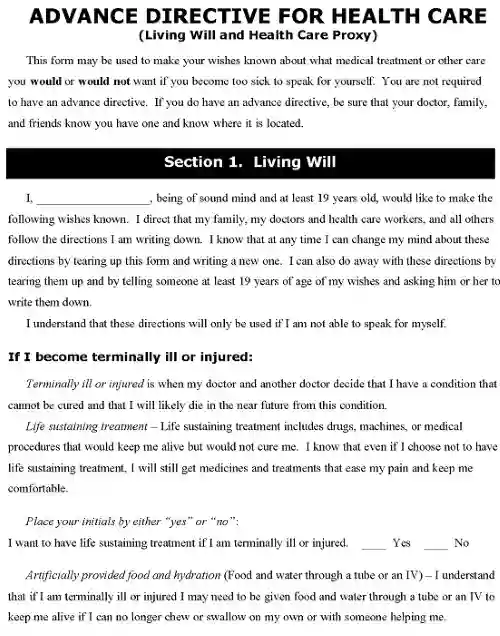An Advance Directive for Health Care detail the type of health care you do or do not want when you can’t make decisions for yourself. You should also appoint someone who can legally act on your behalf to make sure your wishes are carried out.
States have designated forms for these, making it simple for medical professionals to understand the purpose of the document. States refer to their advance directive forms using a variety of terms, which further complicates matters. Click the state name in the table at the bottom of this page to access information for your specific state.
Example of Advance Health Care Directive
What is an advance directive for health care?
Advance directive is the general term that refers to the various documents that could include a living will, instruction directive, health care proxy or health care power of attorney.
- A living will alerts medical professionals and your family to the treatments you want to receive or refuse. In most states, this document only comes into effect if you meet specific medical criteria and are unable to make decisions.
- In a health care power of attorney (or health care proxy), you select the family member or trusted friend you want to make health care decisions for you when you are unable to do so. In this document, you should give directions to the person you select as your spokesperson (or health care agent or proxy) about the full range of care you want. It is very important that you talk about your health care wishes with the person to whom you are giving legal authority.
The Advance Healthcare Directive forms listed can be used in most states. These are generic forms and are generally easier to complete than the forms provided by states. For the advance directive for health for your state, click the state name in the chart further down the page.
Advance Healthcare Directives By Type
Printable Advance Healthcare Directives By State
Printable Alabama Advance Healthcare Directive
Printable Alaska Advance Healthcare Directive
Printable Arizona Advance Healthcare Directive
Printable Arkansas Advance Healthcare Directive
Printable California Advance Healthcare Directive
Printable Colorado Advance Healthcare Directive
Printable Connecticut Advance Healthcare Directive
Printable Delaware Advance Healthcare Directive
Printable Florida Advance Healthcare Directive
Printable Georgia Advance Healthcare Directive
Printable Hawaii Advance Healthcare Directive
Printable Idaho Advance Healthcare Directive
Printable Illinois Advance Healthcare Directive
Printable Indiana Advance Healthcare Directive
Printable Iowa Advance Healthcare Directive
Printable Kansas Advance Healthcare Directive
Printable Kentucky Advance Healthcare Directive
Printable Louisiana Advance Healthcare Directive
Printable Maine Advance Healthcare Directive
Printable Maryland Advance Healthcare Directive
Printable Massachusetts Advance Healthcare Directive
Printable Michigan Advance Healthcare Directive
Printable Minnesota Advance Healthcare Directive
Printable Mississippi Advance Healthcare Directive
Printable Missouri Advance Healthcare Directive
Printable Montana Advance Healthcare Directive
Printable Nebraska Advance Healthcare Directive
Printable Nevada Advance Healthcare Directive
Printable New Hampshire Advance Healthcare Directive
Printable New Jersey Advance Healthcare Directive
Printable New Mexico Advance Healthcare Directive
Printable New York Advance Healthcare Directive
Printable North Carolina Advance Healthcare Directive
Printable North Dakota Advance Healthcare Directive
Printable Ohio Advance Healthcare Directive
Printable Oklahoma Advance Healthcare Directive
Printable Oregon Advance Healthcare Directive
Printable Pennsylvania Advance Healthcare Directive
Printable Rhode Island Advance Healthcare Directive
Printable South Carolina Advance Healthcare Directive
Printable South Dakota Advance Healthcare Directive
Printable Tennessee Advance Healthcare Directive
Printable Texas Advance Healthcare Directive
Printable Utah Advance Healthcare Directive
Printable Vermont Advance Healthcare Directive
Printable Virginia Advance Healthcare Directive
Printable Washington Advance Healthcare Directive
Printable West Virginia Advance Healthcare Directive
Printable Wisconsin Advance Healthcare Directive
Printable Wyoming Advance Healthcare Directive
Will Forms — Trust Forms — Search For Legal Forms — Printable Legal Forms — Bill of Sale Forms — Personal Legal Forms — Business Legal Forms
